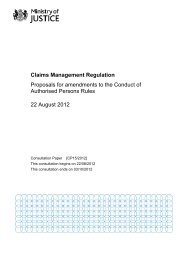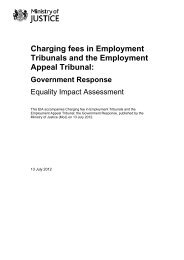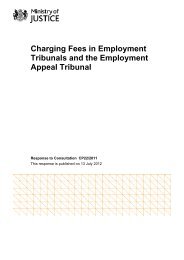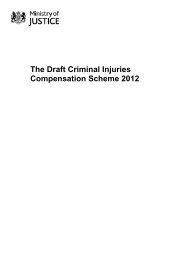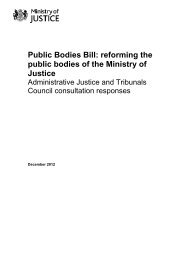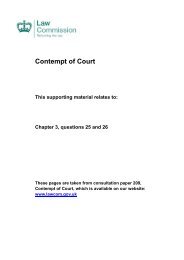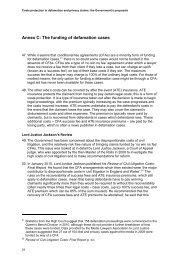Appointments and Diversity 'A Judiciary for the ... - Ministry of Justice
Appointments and Diversity 'A Judiciary for the ... - Ministry of Justice
Appointments and Diversity 'A Judiciary for the ... - Ministry of Justice
You also want an ePaper? Increase the reach of your titles
YUMPU automatically turns print PDFs into web optimized ePapers that Google loves.
<strong>Appointments</strong> <strong>and</strong> <strong>Diversity</strong> A <strong>Judiciary</strong> <strong>for</strong> <strong>the</strong> 21st Century’<br />
Response to public consultation<br />
application could be <strong>the</strong> deciding factor in <strong>the</strong> appointment <strong>of</strong> a number <strong>of</strong> c<strong>and</strong>idates<br />
from under-represented groups. Moreover, permitting its use would send out a strong<br />
signal that diversity in judicial appointments is important, without undermining <strong>the</strong><br />
merit principle.<br />
Paragraphs 99 <strong>and</strong> 101, 25th Report <strong>of</strong> Session 2010–12, Judicial <strong>Appointments</strong><br />
96. We <strong>the</strong>re<strong>for</strong>e intend to enable <strong>the</strong> use <strong>of</strong> a ‘tipping point’ provision, but not to<br />
dilute <strong>the</strong> merit principle. It is intended that a “tipping point” principle could be<br />
applied <strong>and</strong> <strong>the</strong> provision that appointments be based solely on merit also be<br />
retained in <strong>the</strong> Constitutional Re<strong>for</strong>m Act 2005. This proposal will be developed in<br />
consultation with <strong>the</strong> JAC, <strong>and</strong> we will consider <strong>the</strong> concerns expressed during<br />
consultation around <strong>the</strong> problem <strong>of</strong> prioritisation <strong>of</strong> different protected characteristics.<br />
Question 15: Do you agree that all fee-paid appointments should ordinarily be<br />
limited to three renewable 5 year terms, with options to extend tenure in<br />
exceptional cases where <strong>the</strong>re is a clear business need<br />
97. This question elicited <strong>the</strong> highest number <strong>of</strong> responses – 73, including many from<br />
individual fee-paid judicial <strong>of</strong>fice holders. In total, twice as many respondents were<br />
against <strong>the</strong> proposal as in favour (49 to 24).<br />
98. The arguments against were on <strong>the</strong> basis <strong>of</strong> <strong>the</strong> proposal impinging on <strong>the</strong> ability <strong>of</strong><br />
courts <strong>and</strong> tribunals to meet <strong>the</strong>ir business need but also that <strong>the</strong> policy would detract<br />
from diversity in <strong>the</strong> judiciary. This is because <strong>the</strong> suggestion is that fee paid <strong>of</strong>fices<br />
allow <strong>for</strong> more diversity as people can work <strong>for</strong> only short periods <strong>and</strong> <strong>the</strong>re<strong>for</strong>e can<br />
more easily balance o<strong>the</strong>r responsibilities.<br />
99. Support <strong>for</strong> <strong>the</strong> proposal was largely on <strong>the</strong> basis <strong>of</strong> ensuring an ongoing ‘churn’ <strong>of</strong><br />
judges in fee paid positions to ensure <strong>the</strong> potential pool <strong>for</strong> salaried <strong>of</strong>fice is<br />
constantly refreshed.<br />
100. The House <strong>of</strong> Lords Constitution Committee did not specifically make reference to<br />
this proposal, however <strong>the</strong>y made a general observation concerning <strong>the</strong><br />
recommendations arising from <strong>the</strong> report <strong>of</strong> <strong>the</strong> Advisory Panel on Judicial <strong>Diversity</strong>,<br />
not specifically discussed:<br />
We support all <strong>the</strong> recommendations <strong>of</strong> <strong>the</strong> Advisory Panel on Judicial <strong>Diversity</strong> <strong>and</strong><br />
urge all those responsible to implement <strong>the</strong> recommendations more rapidly than<br />
hi<strong>the</strong>rto.<br />
Paragraph 82, 25th Report <strong>of</strong> Session 2010–12, Judicial <strong>Appointments</strong><br />
101. The consultation responses received make a strong case that <strong>the</strong> proposed re<strong>for</strong>m<br />
would significantly impact specialist tribunal posts <strong>and</strong> could affect a relatively more<br />
diverse group <strong>of</strong> judges. There<strong>for</strong>e, we do not consider that <strong>the</strong> policy should be<br />
taken <strong>for</strong>ward at this stage.<br />
102. We do, however, consider that <strong>the</strong> more general point that we should ensure fee paid<br />
opportunities are available to a wide group <strong>of</strong> applicants is important <strong>and</strong> <strong>the</strong>re may<br />
be o<strong>the</strong>r more targeted ways to address this. In particular some respondents<br />
suggested that <strong>the</strong>re was an issue relating to fee paid opportunities, which are <strong>of</strong>ten<br />
populated by those retiring from salaried work in advance <strong>of</strong> <strong>the</strong>ir statutory retirement<br />
age.<br />
21



